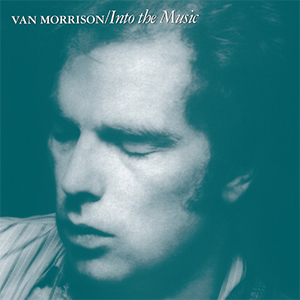
Into the Music
Into the Music is the 11th studio album by Northern Irish singer-songwriter Van Morrison, and was released in August 1979. It includes "Bright Side of the Road", which peaked at number 63 on the UK Singles Chart, and other songs in which Morrison sought to return to his more profound and transcendent style after the pop-oriented Wavelength. The record received favourable reviews from several music critics and was named as one of the year's best albums in the Pazz & Jop critics' poll.
Into the Music
Recording[edit]
Into the Music was recorded in early 1979 at the Record Plant in Sausalito, California, with Mick Glossop as engineer.[1]
During the recording of the album, one of the musicians, trumpet player Mark Isham, referred Morrison to Pee Wee Ellis who lived nearby. Morrison brought him in to do the horn charts for "Troubadours", but Ellis remained and worked on the entire album. The band also included Toni Marcus on strings, Robin Williamson on penny whistle, and Ry Cooder playing slide guitar on "Full Force Gale".[2]
Music and lyrics[edit]
Morrison wrote most of the songs while he was staying with Herbie Armstrong in the Cotswold village of Epwell, England, and the sense of place is reflected in the spirit of the music. During this time, he would often walk through the fields with his guitar composing the future album's songs.[3]
Erik Hage commented that after the favourable commercial reception of Wavelength, Morrison was inspired to "return to something deeper, to once again take up the quest for music that was spontaneous, meditative, and transcendent—music that satisfied the other side of his artistic nature."[4] Morrison was quoted on his opinion of the album, "Into the Music was about the first album where I felt, I'm starting here...the Wavelength thing, I didn't really feel that was me." (1988) "That's when I got back into it. That's why I called it Into the Music." (1984)[5]
The opening track, "Bright Side of the Road" peaked at number 63 on the UK Singles Chart. The healing power of music would be subtly introduced on "And the Healing Has Begun", and would be a continuing theme in Morrison's music. Although celebration of love and life was the predominant theme of the album, this was especially true of "Troubadours", "Steppin' Out Queen" and "You Make Me Feel So Free".[6] "Troubadours" is an uplifting celebration of the singer-songwriter from ancient days, walking through towns "singin songs of love and chivalry". "Rolling Hills" is a joyful song in which the singer directly refers to Christianity and to living his life "in Him" and reading the Bible. The album is notable for its interpolation of an elegiac version of the fifties pop hit "It's All in the Game". It was a B-side of the Morrison song "Cleaning Windows".[7]
Aftermath[edit]
After the release of Into the Music and before his next release Common One in 1980, Morrison appeared at the Montreux Jazz Festival with a fleshed-out band. He performed two of the songs from the album, "Troubadours" and "Angeliou". These two songs featured Morrison interacting with the brass section, composed of Pee Wee Ellis and Mark Isham. Erik Hage describes this musical relationship between Morrison and the two brass musicians as "simply stunning".[23] Morrison's 2006-released DVD, Live at Montreux 1980/1974, contained these performances of the two songs.
The 29 January 2008 reissued and remastered version of Into the Music contains alternative takes of "Steppin' Out Queen" and "Troubadours".
Musicians
Production